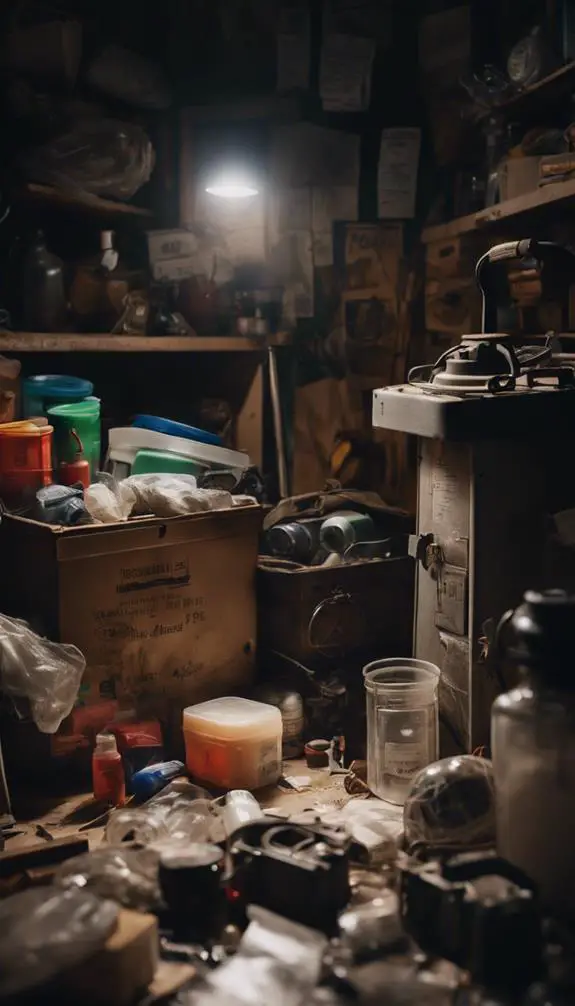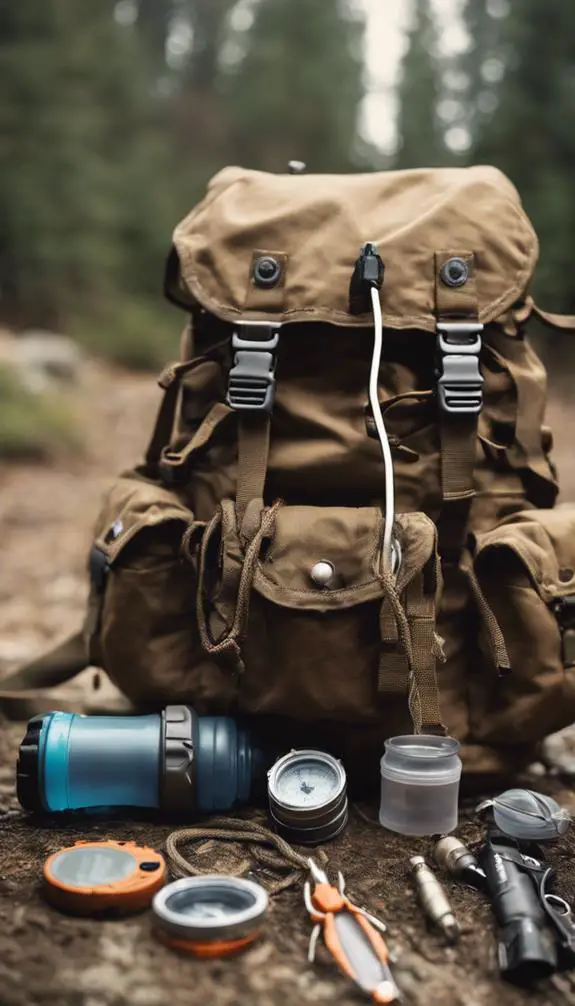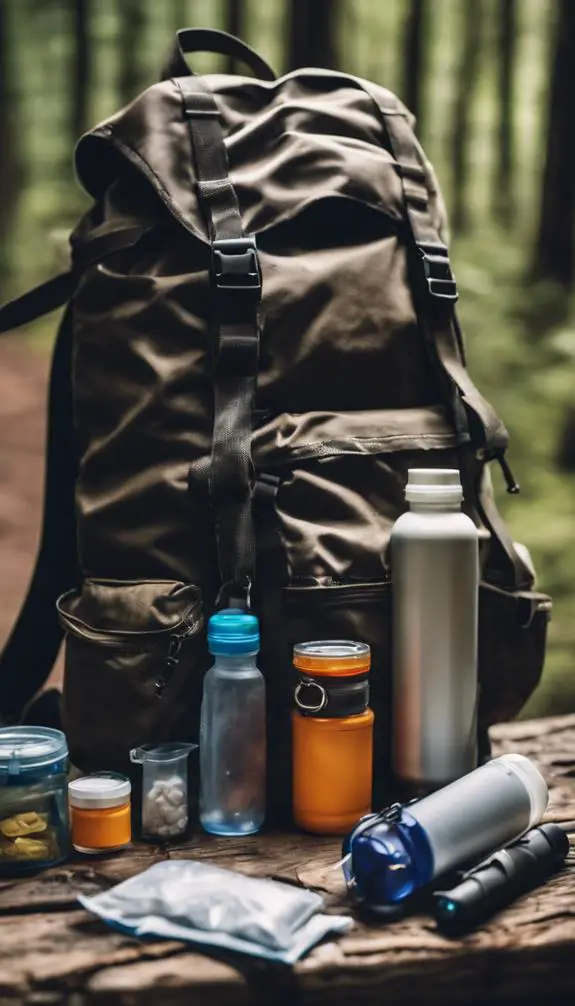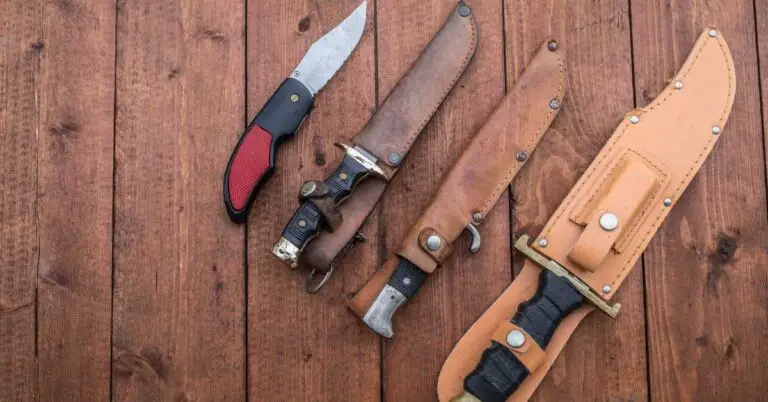As you start building your emergency preparedness plan, it's vital to ponder the often-overlooked aspects that can make all the difference in a crisis. You've probably stockpiled food and water, but have you stopped to reflect on your physical ability to defend yourself or evacuate quickly if needed? What about your emotional resilience and crisis coping skills – are you prepared to handle the mental toll of a disaster? By focusing solely on supplies, you might be neglecting critical elements that will ultimately determine your survival. What else are you missing, and how can you guarantee you're truly ready for the unexpected?
Summary
- Ignoring personal fitness and health can lead to physical limitations that hinder survival in emergency situations.
- Inadequate water purification methods and storage containers can result in water scarcity and contamination.
- Insufficient first aid training and self-defense skills can lead to inadequate response to medical emergencies and physical confrontations.
- Lack of a reliable emergency communication plan and community network can leave family safety to chance and limit access to resources and support.
- Overlooking home security vulnerabilities and wilderness survival skills can leave individuals and families unprepared for emergency situations outside the home.
Ignoring Personal Fitness and Health

Rarely do beginner preppers prioritize personal fitness and health, often overlooking these essential aspects of preparedness.
You may have stockpiled food and water, but if you're not physically capable of defending yourself or evacuating quickly, your preparations are for nothing.
Schedule regular medical checkups to identify and address any health concerns before they become critical.
Assess your dietary needs, considering any allergies, intolerances, or restrictions that may impact your ability to survive in an emergency.
Inadequate Water Storage and Purification

You're likely underestimating how much water you'll need in an emergency, and your storage containers may not be up to the task.
Additionally, you might be relying on insufficient purification methods, which can lead to waterborne illnesses.
It's vital to evaluate your water quantity, purification techniques, and storage containers to guarantee you're prepared for the long haul.
Water Quantity Falling Short
Your water storage plan is only as strong as its weakest link, and for many beginner preppers, that link is inadequate storage and purification.
You might've a solid plan for collecting and treating water, but if you don't have enough storage, you'll be facing water scarcity in no time.
In a survival situation, you can't afford to rely on a single source of water. You need a backup plan, and that means storing enough water to last you and your family for an extended period.
Failure to do so will lead to water rationing, which can be a formidable task, especially when it comes to allocating limited resources.
Don't underestimate the importance of storing enough water; it's a crucial component of your survival strategy.
Insufficient Purification Methods Used
Having a sufficient amount of stored water is only half the battle; the other half is guaranteeing it's safe to drink.
You've stockpiled water, but have you considered how you'll purify it when the time comes? Insufficient purification methods can lead to waterborne illnesses, which can be deadly in a survival situation.
You need a reliable way to test your water for contaminants and a maintenance plan for your filters. Regular water testing will alert you to any changes in water quality, allowing you to adjust your purification methods accordingly.
Don't forget to perform routine filter maintenance to certify they continue to remove impurities effectively. Stay safe and healthy by prioritizing water purification in your prep plan.
Storage Containers Not Prepared
Since water storage is a critical component of emergency preparedness, it's surprising how often beginners overlook the importance of proper storage containers.
You need containers that are durable, food-grade, and resistant to corrosion and UV light. Don't assume that any old container will do – you risk contaminating your water supply.
Make sure you have a system for labeling and organizing your containers, including container labels and a container inventory. This will help you quickly identify what's inside and confirm you're not running low on essential supplies.
Invest in high-quality containers that can withstand the elements and keep your water safe and clean.
Lack of Alternative Cooking Methods

You're likely relying on your electric stove or gas range to cook meals, but what if they're unavailable?
You'll need alternative cooking methods and fuel sources to prepare food, such as stockpiling fuel for a camping stove or exploring solar oven options.
Without a plan, you'll be left struggling to cook even the simplest of meals.
Fuel for the Fire
When disaster strikes and the power grid goes down, your electric stove and microwave become useless, leaving you reliant on alternative cooking methods to prepare meals.
You'll need a reliable way to start a fire, such as waterproof matches, lighters, or firestarters like ferrocerium rods. But having a fire starter is only half the battle – you'll also need a steady supply of fuel to keep the flames burning.
Consider stockpiling various fuel varieties like dry firewood, charcoal, propane, or even biofuels like vegetable oil or biodiesel. Don't forget to store them properly to keep them dry and usable.
With the right combination of fire starters and fuel, you'll be able to cook hot meals even when the grid is down.
No Electric Stove
Three crucial days into a grid-down scenario, and you're already struggling to cook a decent meal.
Your electric stove is useless, and you're realizing you relied too heavily on it. You didn't prepare for alternative cooking methods, and now you're paying the price.
Don't get caught off guard – invest in portable grills or outdoor cooking equipment. These tools will guarantee you can still cook nutritious meals even when the grid is down.
Portable grills are compact, lightweight, and easy to use. They're perfect for boiling water, cooking meals, and even making coffee.
Outdoor cooking isn't just about surviving; it's about thriving in a crisis. Take control of your food preparation and don't rely on the grid to feed yourself and your loved ones.
Solar Oven Options
In a prolonged grid-down scenario, having a backup plan for cooking becomes crucial, and solar oven options are an excellent alternative to traditional cooking methods.
You'll want to ponder the type of solar cooker that best suits your needs. There are three main oven types: box, panel, and parabolic.
Box solar ovens are insulated and retain heat well, making them ideal for baking. Panel solar ovens are compact and portable, perfect for boiling water or cooking small meals. Parabolic solar ovens concentrate sunlight onto a small area, achieving high temperatures quickly.
When choosing a solar cooker, ponder factors like cooking time, temperature control, and durability. Having a reliable solar oven option will guarantee you can prepare meals even when the grid is down.
Insufficient First Aid Training

How prepared are you to respond to a medical emergency in a survival situation?
You've stockpiled supplies, but can you treat a Basic Wound or perform Advanced Suturing? Insufficient first aid training is a critical oversight for beginner preppers.
You may have a first aid kit, but do you know how to use it? Can you identify and treat shock, bleeding, or broken bones?
In a survival scenario, medical help may be unavailable, and your skills will be the only thing standing between life and death.
Invest in an exhaustive first aid course that covers wound management, splinting, and other essential skills. Don't assume someone else will take care of medical emergencies – take responsibility for your own safety and well-being.
No Emergency Communication Plan

You've stockpiled supplies and learned basic first aid, but can you communicate with the outside world when disaster strikes?
Without a reliable emergency communication plan, you're leaving your family's safety to chance. Establish radio protocols to guarantee you can reach loved ones and receive critical updates.
Designate a primary and secondary point of contact, and make sure all family members know how to operate the chosen communication devices.
Develop a simple, yet effective, family protocol for checking in and exchanging information. This should include a predetermined meeting point, emergency contact numbers, and a plan for reuniting if you get separated.
Don't assume you'll have access to cell service or the internet – prepare for alternative communication methods to stay connected and informed during a crisis.
Failure to Consider Pet Preparedness

Establishing a reliable emergency communication plan is only half the battle; another often-overlooked aspect of preparedness is guaranteeing the safety and well-being of your furry friends.
You've got to think about their needs in an emergency, too. Do you have a plan for emergency evacuation with your pet? What about pet insurance to cover unexpected vet bills?
You'll want to research pet-friendly shelters or hotels, and identify safe zones for your pet in case of an evacuation. Don't forget to stock up on pet supplies like food, water, and medication.
Create a pet emergency kit with essentials like a carrier, leash, and identification. By considering your pet's needs, you'll guarantee their safety and your own peace of mind in a crisis.
Inadequate Home Security Measures

Nearly every prepper overlooks one critical aspect of their emergency plan: inadequate home security measures.
You're preparing for disasters, but have you secured your home from potential threats? You may have stockpiled food and water, but what's the point if your home is vulnerable to intruders?
Invest in smart locks that can be controlled remotely, ensuring you can lock out unwanted visitors even when you're not there. Install security cameras to monitor your property and deter potential intruders.
Don't underestimate the importance of home security in your emergency plan. By addressing these vulnerabilities, you'll be better equipped to protect yourself and your loved ones during a crisis.
Limited Knowledge of Wilderness Survival

Beyond the confines of your home, lies an unforgiving landscape that can be deadly if you're not prepared.
You may think you're ready to bug out, but do you have a wilderness mindset? Can you prioritize survival needs like shelter, water, and fire?
Most beginner preppers overlook the importance of wilderness survival skills, assuming they'll figure it out on the go. Don't make that mistake.
Learn how to navigate, build a shelter, and start a fire without matches. Understand your survival priorities and learn to adapt to changing environments.
In the wilderness, knowledge is power, and lack of preparation can be fatal. Take the time to develop your wilderness survival skills, and you'll be more confident in your ability to survive outside your home.
No Plan for Waste Management

You've honed your wilderness survival skills, but what about the not-so-glamorous task of waste management?
It's vital to have a plan in place to maintain sanitation and prevent the spread of diseases. You'll need to segregate waste into categories like human, food, and hazardous waste.
Develop sanitation protocols for handling each type, including proper disposal methods and hygiene practices. Don't forget to stock up on necessary supplies like toilet paper, hand sanitizer, and biodegradable soap.
Overlooking Mental Health Preparation

A crisis can strike at any moment, and when it does, the unprepared mind can be just as crippling as the unprepared body.
You might've stockpiled food and water, but if you haven't prepared your mind, you're still vulnerable. Crisis coping skills are essential to survive the initial shock and chaos.
It's pivotal to develop emotional resilience to bounce back from the trauma and uncertainty. You need to learn how to manage your fear, anxiety, and stress levels to make rational decisions.
Practice mindfulness, meditation, and breathing exercises to calm your mind. Develop a support network and learn to communicate effectively with your team.
Insufficient Skill in Self-Defense

You're likely to face physical confrontations in a crisis, and you'll need to know effective techniques to protect yourself.
Developing mental preparation strategies is also vital to stay focused and composed under pressure.
To round out your self-defense skills, you must also learn weapon handling fundamentals to avoid accidents and guarantee you're using your tools effectively.
Physical Confrontation Techniques
While preparing for the unexpected, it's easy to focus on stockpiling supplies and overlook a critical aspect of survival: physical confrontation techniques.
You must develop skills to protect yourself and your loved ones. De-escalation techniques are essential to avoid physical confrontations, but you should also be prepared to defend yourself if necessary.
Consider training in ground fighting, which teaches you how to defend yourself when taken to the ground. Practice scenarios where you're attacked from behind or caught off guard.
Knowing how to protect your crucial areas, escape from holds, and use your opponent's momentum against them can be lifesaving. Don't underestimate the importance of physical confrontation techniques in your prepping plan.
Mental Preparation Strategies
Your self-defense skills may not be as polished as you think, and that's a formidable reality to face.
Vital to acknowledge this gap and focus on mental preparation strategies to bridge it. A mindset shift is pivotal – you must accept that self-defense isn't just about physical techniques, but also about emotional resilience.
You need to develop the mental toughness to stay calm under pressure, make quick decisions, and adapt to unexpected situations. This requires training your mind to respond effectively in high-stress scenarios.
Practice visualization exercises, scenario-based training, and stress inoculation to build your emotional resilience. By combining physical skills with mental preparation, you'll become a more formidable opponent and increase your chances of survival in a self-defense situation.
Weapon Handling Fundamentals
With the reality of insufficient self-defense skills staring you in the face, it's vital to focus on weapon handling fundamentals to bridge the gap.
You must prioritize gun safety above all else, recognizing that a firearm is a tool, not a toy. Familiarize yourself with your weapon's mechanics, understanding how to load, unload, and handle it safely.
Mastering trigger control is key, as a jerky or accidental trigger pull can have disastrous consequences. Practice proper stance, grip, and sight alignment to guarantee accuracy.
Regularly train and rehearse various scenarios to build muscle memory, allowing you to react instinctively in high-stress situations. By focusing on these fundamentals, you'll develop the skills and confidence to defend yourself and your loved ones effectively.
Neglecting Important Documents and Copies

You've likely spent considerable time and effort stockpiling food, water, and other essential supplies, but have you given equal attention to gathering and safeguarding important documents and copies?
Key records like birth certificates, passports, insurance policies, and financial documents are essential to your identity, security, and well-being.
Make digital copies of these documents and store them securely online or on an external hard drive. Consider renting a safe deposit box at a bank or investing in a fireproof safe to protect physical copies.
Don't leave your most valuable information vulnerable to natural disasters, theft, or loss. Take the necessary steps to secure your important documents and copies, ensuring you're prepared for any situation.
Failing to Establish a Community Network

One of the most critical components of a successful preparedness plan is often overlooked: building a community network.
You're not alone in this journey, and having a strong support system can be a game-changer in a crisis. You'll want to establish relationships with like-minded individuals who share your values and goals.
This network can provide valuable skills, resources, and knowledge that'll help you overcome challenges. Focus on community building by attending prepping meetups, joining online forums, and participating in local preparedness groups.
As you expand your network, you'll gain access to a collective knowledge base, increasing your chances of survival and thriving in a post-disaster world.
FAQs
How Often Should I Update My Emergency Preparedness Plan?
You should review and revise your emergency preparedness plan every 6-12 months, or when you experience significant life changes, to guarantee it remains relevant and effective in helping you achieve freedom from uncertainty and chaos.
Can I Use Pool Water for Drinking in an Emergency?
You can use pool water in an emergency, but first, you'll need to guarantee the water quality is safe by testing pH and chlorine levels, and considering recent pool maintenance, like cleaning and chemical additions, to avoid waterborne illnesses.
How Do I Disinfect Water Without Purification Tablets?
You'll effectively disinfect water without purification tablets by using boiling methods, bringing it to a rolling boil for 1-3 minutes, or trying solar disinfection, placing the water in a clear bottle and leaving it in direct sunlight for 6 hours.
What Are the Essential Items for a Portable First Aid Kit?
When assembling a portable first aid kit, you'll want to prioritize wound cleaning essentials like antiseptic wipes and saline solution, as well as medication management tools like pill boxes and a medication schedule.
Can I Use My Phone's GPS for Wilderness Navigation?
When venturing into the wilderness, you'll quickly realize your phone's GPS isn't as reliable as you thought; its accuracy can be spotty, so it's vital you also learn map reading skills to guarantee you're not lost in the woods.
Conclusion
As you build your preparedness plan, remember that it's not just about stockpiling supplies. You're only as strong as your weakest link. Don't neglect your physical fitness, mental resilience, and crisis coping skills. Invest in first aid training, alternative cooking methods, and a reliable emergency communication plan. Stay proactive and adaptable, and never stop learning. Your preparedness journey is a continuous process, and your life may depend on it.




